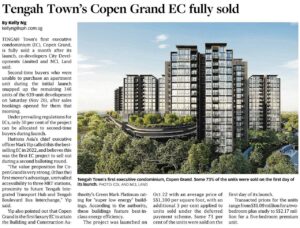The post ALTURA EC Launching: Why is everyone going crazy about EC in Singapore? appeared first on Wing Tai Holdings Singapore.
]]>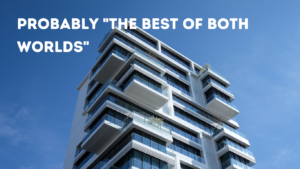
The Rising Craze of Executive Condominiums in Singapore: Affordable Luxury and Exclusive Living
Executive condominiums (ECs) are highly sought-after residential options in Singapore, standing out as a more upscale choice compared to other HDB flats such as BTO flats, Sale of Balance Flats (SBF) units, and Open Booking of Flats (OBF) units.
Referred to as “sandwich flats,” executive condominiums in Singapore represent a unique housing category combining public and private housing elements. They cater to middle-income Singaporeans who are ineligible for an HDB flat due to the income ceiling, yet consider private condominiums financially out of reach. What sets ECs apart is their attractive pricing in comparison to private condominiums while still offering comparable amenities and designs.
“Wait, Sooooooo What’s so good about Executive Condominium then?”
“Isn’t Private Condo still superior over Executive Condo?”
LET’S TAKE A LOOK AT THE COMPARISON BELOW
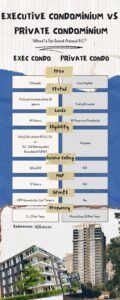
Advantages of Buying Executive Condos in Singapore
1. Executive Condos Are Priced lower Compared to Private Condos
Executive Condominiums buyers get to enjoy the perks of living in private property as subsidized by the government, provided that they fulfill the eligibility requirements. In addition, first-time Executive Condo buyers may be entitled to CPF housing grants. Even though the lower price tag, EC owners also get to enjoy the full condo facilities and fully equipped kitchens and bathrooms that are comparable to condominiums.
“Considering buying at subsidized rates, and can be sold freely in open market after 10 year!”
2. Privatised After 10-Year Mark.
Given their more affordable cost and the 10-year privatization rule, numerous buyers of executive condominiums (ECs) hold the belief that these properties may experience higher capital appreciation compared to private condominiums after the 10-year mark. Don’t forget that you will be buying from HDB at a subsidized price. *Grin*
3. CPF Housing Grants for First-Timer Applicants (EC)
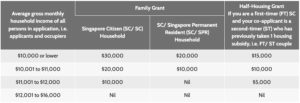
Households comprising SC and SPR individuals are eligible for an additional $10,000. This amount can be obtained when the SPR member converts to an SC and applies for the Citizen Top-Up within 6 months of meeting the eligibility criteria.
4. Favorable Housing Option for Middle-Income Singaporeans Designed for Own Stay
Executive condominiums (ECs) were primarily designed to serve as residences rather than investment assets. As part of this intention, specific regulations exist for EC owners. Firstly, the buyer must reside in the EC for a minimum of five years before it can be sold. Furthermore, even after the five years, there are restrictions on the sale, allowing only Singapore Citizens or Singapore Permanent Residents to purchase the property. However, once reaches the 10-year mark, the EC is effectively transformed into a private condominium and can be freely sold to anyone on the open market!
These measures aim to provide context to the nature of ECs, which are subsidized by the state and intended to facilitate homeownership for Singaporeans rather than serving as investment opportunities for real estate investors. While the Minimum Occupation Period (MOP) may be seen as a constraint, it does not pose any obstacles for those who view an EC primarily as a place to call home and have genuine intentions of residing in it.
5. No ABSD payable
Good news! Due to the recent implementation of hefty ABSD increment, many HDB upgrades face issues with forking out the ABSD upfront though it can be remission after selling the previous home within six months of getting the new one. But if you purchase an Executive Condominium (EC), you don’t need to pay the ABSD first, you do still need to dispose of your flat within six months but at least there is no need for extra cash or CPF savings upfront. Yay!
disadvantages of buying EXECUTIVE CONDOS IN SINGAPORE
1. Limited to Bank Loans for Executive Condo Purchase
In contrast to an HDB loan, when obtaining a bank loan, the Loan-to-Value (LTV) limit is set at 75% of the property’s valuation or price, whichever is lower. This implies that you will need to contribute a minimum of 25% of your funds for the down payment of your executive condominium (EC). Out of this amount, 5% must be paid in cash, while the remaining 20% can be financed through a combination of CPF funds and cash.
Furthermore, you will also need to consider the Mortgage Servicing Ratio (MSR) and Total Debt Servicing Ratio (TDSR) rules. Under the MSR rule, you are only allowed to allocate a maximum of 30% of your monthly income toward servicing your home loan. Regarding the TDSR rule, the total amount dedicated to debt repayments, encompassing obligations such as car loans, credit cards, and student loans, cannot exceed 55% of your monthly income.
2. HDB Rules Apply
As previously mentioned, executive condominiums (ECs) are classified as HDB properties in the initial 10 years. During this duration, it is mandatory to adhere to HDB regulations, including the Minimum Occupation Period (MOP) requirement. The MOP entails residing in your EC for five years before you can consider selling or renting it out, limited to Singapore Citizens (SCs) and Permanent Residents (PRs) only. It’s important to note that the MOP period commences once the development has obtained its Temporary Occupation Permit (TOP).
3. New EC Launches Are Limited
Due to the high demand and scarcity of EC launches in Singapore, whenever there is a new EC launch, it tends to spark a frenzied rush among potential buyers.
Upcoming EC launch for 2023
ALTURA EC
1st EC launch in Bukit Batok after more than 20 Years, 1KM from the future ACS Primary, Princess Elizabeth, Dulwich College, and more!
Number of Units: 360
Size: 134,004 Sqft
Location: D23 – Hillview, Dairy Farm, Bukit Panjang, Choa Chu Kang
Address: Bukit Batok West Ave 8
Developer: TQS (2) Development PTE LTD
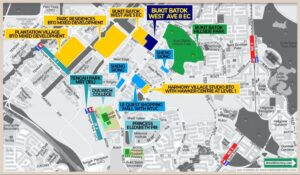
Visit ALTURA EC Site for more information. Learn more.

For more EC eligibility & property inquiries, please feel free to connect with us to learn more!
Looking for more similar articles? Check out BuyCondo’s Blog section!
The post ALTURA EC Launching: Why is everyone going crazy about EC in Singapore? appeared first on Wing Tai Holdings Singapore.
]]>The post Copen Grand (Tengah Town) EC Fully Sold appeared first on Wing Tai Holdings Singapore.
]]>Copen Grand success does not come as a surprise.
The post Copen Grand (Tengah Town) EC Fully Sold appeared first on Wing Tai Holdings Singapore.
]]>The post FAQ: All You Need to Know About Executive Condominiums (ECs) appeared first on Wing Tai Holdings Singapore.
]]>What is an executive condominium?
An executive condominium (EC) refers to strata-titled apartments in Singapore. These ECs are constructed and sold by real estate developers to qualified Singaporean households.
Is an executive condo part of HDB?
For the initial 10 years, executive condominiums are classified as Housing and Development Board (HDB) assets, leading to their classification as hybrid private-public properties.
Nonetheless, the Singaporean government provides financial support in pricing and permits the utilisation of specific CPF housing grants (elaborated further below).
What is the difference between a private condo and an executive condo?
In the initial years of ownership, ECs are subjected to specific limitations, during which they are exclusively sold to Singaporean citizens.
After a designated duration, usually around five years, these restrictions are removed, enabling the owner to sell the EC to citizens and permanent residents. Other limitations, guidelines, and mandates must be adhered to as well.
In contrast, private condominiums have little to no restrictions. You can also read about HDB vs. private condos, which we think you’ll find interesting.
Can I buy a new EC if I own an HDB or DBSS flat?
Yes, but you and/or your spouse MUST
- dispose of the flat within 6 months from the date of issuance of TOP.
- already stayed in your flat for at least 5 years if bought directly from HDB or with a grant.
- fulfilled your MOP before this EC gets TOP if you bought a resale flat without a grant.
- have not bought a flat directly from HDB or with a grant more than once.
Can I buy another EC if I currently own one?
After selling your EC on the open market, you must wait 30 months before you can apply to buy another.
Can I buy an executive condo without my husband’s name?
- The purchase of a resale Executive Condominium (EC) by oneself is allowed for Singapore Citizens (SC) and Singapore Permanent Residents (SPR), regardless of marital status.
- Acquiring a newly launched EC is contingent upon adhering to the HDB eligibility policy. Therefore, you must meet the requirements outlined in the eligibility scheme.
Can a divorcee buy an Executive Condo?
In case of divorce, if your former spouse is currently a proprietor of a Developer-acquired DBSS flat or EC unit, an HDB-purchased flat, or an HDB resale flat obtained through the CPF Housing Grant Scheme, you are required to observe a waiting duration of three years from the official finalisation of the divorce before you can apply to purchase an Executive Condominium.
Why do people buy an EC?
In addition to qualifying for CPF housing grants, ECs generally have prices around 20% lower than regular condominiums because of the financial support provided by the government during their construction stage.
These subsidies aim to enhance affordability for a specific category of potential home purchasers.
When can I sell my EC unit?
You can sell your EC unit on the open market to Singapore citizens or Singapore PRs after a 5-year Minimum Occupation Period (MOP), which starts from the date of TOP.
After 10 years, it will be fully privatised, which means it can be sold to anyone, including foreigners or developers.
When can I rent out my entire EC unit?
Renting out the whole EC unit within the 5-year MOP is not allowed unless for valid reasons and subject to HDB’s written approval.
When can I sublet my EC bedroom?
During the 5-year MOP, computed from the date of TOP, an EC owner and the members stated in the application must be in continuous physical occupation of the EC unit.
You may sublet the other bedrooms in the unit, but you must retain at least one bedroom for your physical occupation. You must register the subletting of bedrooms with HDB within 7 days. You must also notify HDB when you renew or terminate the subletting of bedrooms or when there are changes to your subtenants’ particulars.
Can I buy EC if I own a private property in Singapore or overseas?
Suppose you or your spouse own a private property in Singapore/overseas. In that case, you are not eligible to buy an EC unit from a developer unless your property falls within any of the categories in Annex A of the application form.
Can I buy or invest in private residential property in Singapore or overseas after I buy an EC unit?
Yes, but only after you fulfil the 5-year MOP period of your purchased EC.
Do I have to pay the agent a commission to purchase EC?
No, you do not have to pay an agent any commission to purchase EC. The agent will assist you in applying, balloting, and booking an EC unit from the developer.
If I bought an EC or DBSS flat with a CPF Housing Grant and terminated the Sale and Purchase Agreement, can I still buy an EC unit?
Yes. But only on condition that a 5-year period has lapsed from the termination date of the Sale and Purchase Agreement of the earlier EC or DBSS flat purchase to the date of application for the current EC.
What is the cost of buying an EC?
- Purchase Price
- Stamp Duty (Purchase Price x 3% – $5,400)
- Legal fee
- ECs are also NOT affected by Additional Buyers Stamp Duty.
How much CPF housing grant am I entitled to?
The CPF Housing Grant is a housing subsidy (in the form of CPF money) that the Government provides. The grant assists eligible first-time families with up to $30,000 to buy an EC from the developer.
Can I use the CPF Housing Grant to pay for the downpayment of an EC unit?
The CPF housing grant you applied for will be credited to your account. The first 5% of the downpayment must be paid in cash. You can use the CPF Housing Grant to pay the remaining 15% of the selling price.
Can I get a loan from HDB to purchase an EC unit?
The HDB does not grant any loans to purchase a unit in EC. Buyers must arrange their mortgage financing through banks and financial institutions.
Do I have to refund my CPF housing grant if I cancel my purchase of EC after I sign the Sales and Purchase Agreement?
Yes, if you purchase the EC under the Fiance/Fiancee Scheme and cannot produce the required marriage certificate. You are to return the CPF Housing grant with accrued interest.
Will I be entitled to an additional housing grant if I purchase an EC unit?
No.
Do I have to pay a resale levy if I buy an EC from the developer with my CPF housing grant now, sell it, and buy an HDB flat in the future?
Yes, you would have to pay a resale levy of $55,000 in cash before taking possession of the flat.
Do I have to pay a resale levy if I sell my flat, which I bought directly from HDB, and then purchase an EC unit?
No, you do not have to pay any resale levy.
How much will I forfeit if I give up my EC unit after paying the 5% booking fee but before executing the Sales and Purchase Agreement?
The developer will forfeit 25% of the booking fee.
How much will I forfeit if I have already exercised the Sales and Purchase agreement but have not taken possession of the unit?
The developer will forfeit 20% of the purchase price.
Is executive condo freehold?
No, these properties operate on a leasehold of 99 years, and you must fulfill the prerequisites before being eligible to make a purchase.
Is it worth it to buy an executive condo in Singapore?
Yes! Besides qualifying for CPF housing grants, ECs generally have prices around 20% lower than regular condominiums.
This implies that when your EC becomes privatised, you essentially acquire a condominium at a significantly lower cost than the private residence market rate!
Is EC or BTO better?
Both a Build-To-Order (BTO) apartment and an Executive Condominium (EC) present significant prospects for value increase and a more substantial profit margin.
BTO flats come with lower entry hurdles due to their affordability, and they provide a broader array of locations compared to ECs (though still more restricted than resale flats).
What is the salary cap for an executive condo?
The combined earnings of all individuals named in the EC application should not surpass $16,000. Thus, the intended demographic for ECs comprises households with earnings ranging from $14,000 to $16,000 per month.
Upon reserving an EC unit, the property developer will provide instructions regarding document submission, including income-related papers.
What must I bring to book an EC unit?
- NRIC
- birth certificate and marriage certificate
- 3 months payslips (payslip issued for the month of application for EC unit and immediately preceding 2 months) or an official letter from their employers stating their 3 months gross income ( for the month of application for EC unit and immediately preceding 2 months), an income tax return or assessment; and
- other documents as required by the developer or HDB.
The post FAQ: All You Need to Know About Executive Condominiums (ECs) appeared first on Wing Tai Holdings Singapore.
]]>